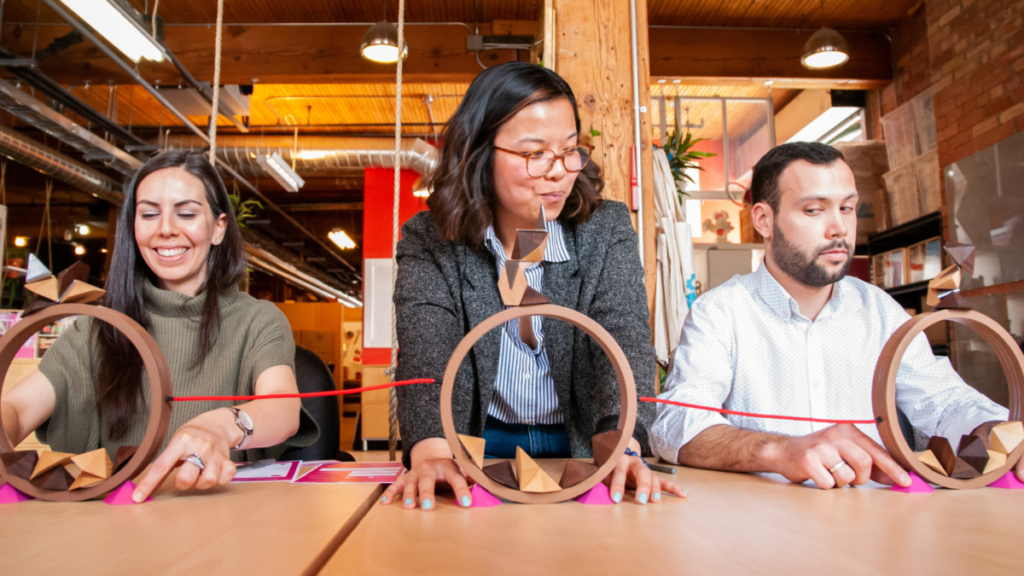Next-gen leadership: The skills no one told you about, but you can’t live without

A demonstration of the Twenty One Toys’ Failure Toy, designed to explore reactions to risk, feedback, and team expectations. Photo courtesy of Twenty One Toys Inc.
Who said you can’t work and play at the same time? And even better: what if play helped you work?
Ilana Ben-Ari, founder of Twenty One Toys, has seen the toys she invented — the Failure Toy, Empathy Toy and Improv Toy — foster better collaboration and communication among an array of professionals and businesspeople. For her, the conclusion was solid: finally, “tools” (in the form of toys) that help people learn in ways they hadn’t before.
“How can we expect our leaders to just show up as experts in these skills that we really never valued, taught or prioritized? So it is a struggle right now,” said the Toronto-based entrepreneur.
In an ever-competitive world, the ability to employ empathy and cultivate interpersonal relationships is increasingly crucial for success, according to various recent reports.
Last year, Forbes outlined their top leadership qualities, with empathy and compassion making the shortlist. In April, Inc promoted empathy and listening as underrated leadership qualities. The World Economic Forum’s 2023 Future of Jobs Report also noted early in the study that empathy and active listening are “core skills.”
Appetite for empathy
Despite the importance of these skills, Ben-Ari said the training has been wanting up until recently. When she started the company in 2012, it was “very niche” to talk about the importance of social and emotional skills, but things have turned around in the last few years.
“Everyone from Brene Brown to Simon Sinek, to Adam Grant all talk about the importance of empathy and resilience,” she said. “Sachi Nadella talks about reinventing Microsoft with empathy. So just the appetite for it has really changed.”
Ben-Ari’s toys have been sold in thirty countries, hundreds of schools, and thousands of boardrooms, including BMO, RBC, and Google. Her work also led to her making Inc Magazine’s Top 100 Female Founders of 2020.
“Usually, when we think of education, we think of textbooks,” she said. “I like to say, ‘Toys are the new textbooks.’ It is play-based learning and education, using completely new tools.”
It became revelatory to her, she said, as management can utilize new tools to gain productivity and morale simultaneously.
Toys R Tools
The Empathy Toy is a game where blindfolded players work together to assemble a puzzle, allowing them to glean insight into the players’ approaches to patience, frustration, and notably, their ways of communication.

One of Canada’s largest banks used the toys to discuss with employees how they handle customer service and communicate with their own customers, said Ben-Ari.
“We’ve had leaders who’ve heard themselves speak to the other players, and realize that that language is not helpful in the way that they lead,” she continued. “The way that you communicate can influence how your message is being received.”
With the Failure Toy, participants work to keep game pieces on a precarious base while attempting to score by creating stable configurations. Points are deducted each time the pieces topple over and the challenge escalates , with each successive round. Following the game, players explore their reactions to risk, feedback, and team expectations.
Ben-Ari said she believes that people “practice failure abstinence,” groomed by an educational system obsessed with top marks and grades, rather than teaching people to be comfortable with failure.
“We only celebrate stories of ‘I failed, but then I succeeded,’” she said. “That’s kind of the only time we talk about how great failure is, as opposed to understanding we just need to build a culture of feedback and experimentation.”
Keys to interacting
In a similar vein, Toronto-based Elan Divon said an emerging trend is young professionals working to improve their social skills. The opportunity to hone skills in handling difficult conversations, networking, collaboration, and conflict management were robbed from many of them during COVID-19 lockdowns, he said.
“If you want to develop the leader, you’ve got to develop the human being of the person,” he continued. “It’s all connected.”
Divon is a Harvard-trained author, speaker, and founder of Divon Academy, an organization that helps students and young professionals develop their leadership skills.
Sweat the small stuff, he teaches, “because the small things are the big thing. And we know that from relationships: if you don’t take out the trash, it puts strain on the relationship. Same as professional life.”
His training includes a “peak performance habits workshop,” with teams that work together on a 21-day habit challenge that he says helps with emotional well being and performance.
It’s his view that the path to success will lie more with interpersonal abilities in the coming years, rather than semesters spent on campus.
“There’s a shift from degrees and pedigree, to work ethic and attitude. And companies care less today about the pedigree; they care less about which school you went to. And if you got a degree, they care more about your attitude and professionalism,” he said.
“The landscape is changing.”
Dangers of not improving
What might occur if those very soft skills are ignored or left to atrophy? Dr. Eleni Gabre-Madhin cautioned: “a toxic culture of in-fighting” and “highly rigid and hierarchical processes.”
Gabre-Madhin, a Swiss economist residing in Washington, DC, is a serial entrepreneur with more than two decades of experience in driving innovation, and was named Newsweek’s Top 125 Global Women of Impact. As Chief Happiness Officer of blueMoon, she’s overseen the incubation and launch of nearly 90 startups.
“We often talk about emotional intelligence or EQ in the workplace, but another underrated leadership skill is cultural sensitivity,” she said. When leaders seek to understand how members of the team may communicate differently due to their background or country of origin, she said it opens up different perspectives.
In light of these changes and challenges, organizations must adapt their training and development programs to better equip leaders for the needs of the modern workplace. This involves recognizing the importance of soft skills and implementing innovative, engaging ways to teach them.
Toys, like those created by Ilana Ben-Ari, offer a glimpse into how we might rethink education and training for leaders by using interactive play to cultivate essential skills.
Ultimately, the success of future leaders — and indeed, the organizations they lead — will hinge not just on what they know, but on how they relate to others, and handle interpersonal exchanges. Grooming these capabilities will be crucial, not just for individual success, but for the health and productivity of entire organizations.
“Leaders want to be connected to their teams — there’s a real hunger for it,” said Ben-Ari.
“This new world of work seems to be embracing these skills now. You cannot have creativity without emotional intelligence, and vice versa. So when we use these big words like leadership and innovation, the core of that always comes down to emotional intelligence.”
Next-gen leadership: The skills no one told you about, but you can’t live without
#Nextgen #leadership #skills #told #live





